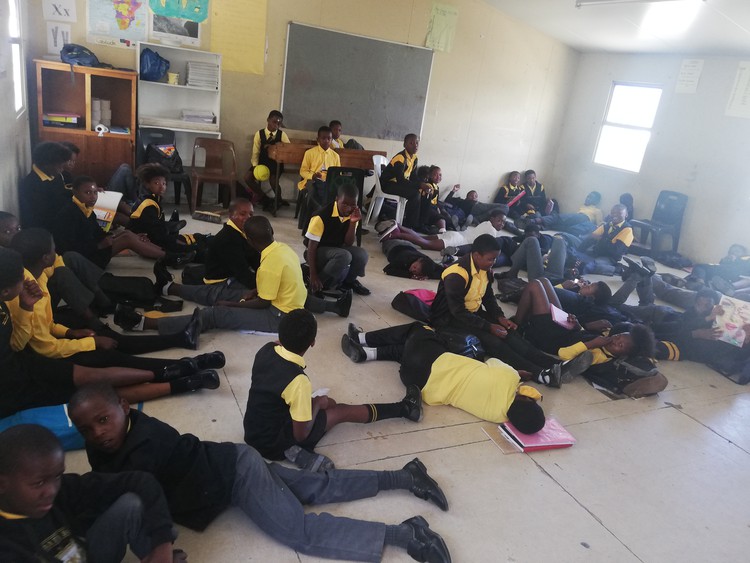
Learners sit on the floor at overcrowded Ukhanyo Primary School. Photo (January 2019): Thembela Ntongana
1 March 2019
At a community meeting on Wednesday night, which followed one held on 15 February, over 150 parents and residents of Masiphumelele resolved to march to the Department of Education in Cape Town on 18 March. They are demanding a second primary school be built in their area. The community started a petition which had almost 90 signatures at the time of writing this report.
Recently GroundUp wrote about the overcrowding in Ukhanyo Primary school, where some of the children were sitting on the floor due to a lack of tables and chairs.
“A teacher can’t even see what is going on at the back of her own class, that is how bad the situation is,” said school governing board (SGB) chairperson Themba Sontundu.
Western Cape Department of Education spokesperson Jessica Shelver said the new school had been built in Ocean View because there was no land available in Masiphumelele. She said the new school would relieve some of the pressure at Ukhanyo. Masiphumelele is a mainly Xhosa speaking township about 2km from Ocean View, a primarily Afrikaans speaking one.
However, Sontundu disagreed. He said learners were returning to Ukhanyo because they struggled with Afrikaans as a second language. Parents could also not afford the cost of transport to Ocean View, he said.
“Even the primary school we have is made out of prefab. The brick classrooms we have were donated to us,” Sobantu told the community. “We are not asking them for a formal building. For now we want the department to identify a piece of land in the community and put up a prefab building.”
Noxolo Ntshuntshe said she was not willing to take her child to Ocean View. “Firstly, it is not a safe area. We hear of people being shot in gang violence frequently. How are we supposed to feel taking our children there to learn?” She said most parents were unemployed and could not afford to send their kids to Ocean View.
Shelver said an application for a transport route was awaiting approval. She said the Ocean View school has changed its language policy and now offers English and Afrikaans and a Xhosa-speaking teacher will start on 1 March.
Shelver said, “Unfortunately, many of the safety risks are a result of community and gang violence … Addressing these issues goes beyond our mandate and control. We are therefore also reliant on other governmental departments and law enforcement agencies, such as the South African Police Service, the Department of Justice, and City of Cape Town law enforcement.”
She said the department did have a role to play. It specifically addressed the behaviour of learners on conflict management and substance abuse.